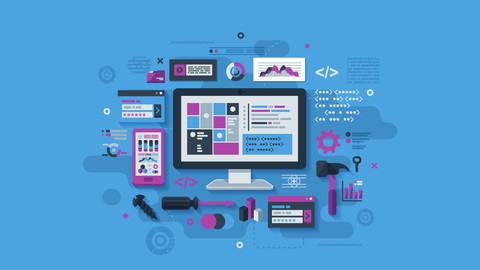
Professional Scala
Professional Scala, available at $49.99, has an average rating of 4.05, with 59 lectures, 8 quizzes, based on 12 reviews, and has 109 subscribers.
You will learn about Understand the key language syntax and core concepts for application development Master the type system to create scalable type-safe applications while cutting down your time spent debugging Understand how you can work with advanced data structures via built-in features such as the Collections library Use classes, objects, and traits to transform a trivial chatbot program into a useful assistant Understand what are pure functions, immutability, and higher-order functions Recognize and implement popular functional programming design patterns This course is ideal for individuals who are This is an ideal course for developers who are looking to learn Scala and is particularly well suited for Java developers looking to migrate across to Scala for application development on the JVM. It is particularly useful for This is an ideal course for developers who are looking to learn Scala and is particularly well suited for Java developers looking to migrate across to Scala for application development on the JVM.
Enroll now: Professional Scala
Summary
Title: Professional Scala
Price: $49.99
Average Rating: 4.05
Number of Lectures: 59
Number of Quizzes: 8
Number of Published Lectures: 59
Number of Published Quizzes: 8
Number of Curriculum Items: 67
Number of Published Curriculum Objects: 67
Original Price: $199.99
Quality Status: approved
Status: Live
What You Will Learn
- Understand the key language syntax and core concepts for application development
- Master the type system to create scalable type-safe applications while cutting down your time spent debugging
- Understand how you can work with advanced data structures via built-in features such as the Collections library
- Use classes, objects, and traits to transform a trivial chatbot program into a useful assistant
- Understand what are pure functions, immutability, and higher-order functions
- Recognize and implement popular functional programming design patterns
Who Should Attend
- This is an ideal course for developers who are looking to learn Scala and is particularly well suited for Java developers looking to migrate across to Scala for application development on the JVM.
Target Audiences
- This is an ideal course for developers who are looking to learn Scala and is particularly well suited for Java developers looking to migrate across to Scala for application development on the JVM.
Professional Scala teaches you how to build and contribute to Scala programs, recognizing common patterns and techniques used with the language. You’ll learn how to write concise, functional code with Scala. After an introduction to core concepts, syntax, and writing example applications with scalac, you’ll learn about the Scala Collections API and how the language handles type safety via static types out-of-the-box. You’ll then learn about advanced functional programming patterns, and how you can write your own Domain Specific Languages (DSLs). By the end of the course, you’ll be equipped with the skills you need to successfully build smart, efficient applications in Scala that can be compiled to the JVM.�
About the Authors
Nimish Narang has a degree in biology and computer science. He has worked with application development and machine learning. His recent achievement was building the biggest ever mobile machine learning course which has many different machine learning and deep learning models in Python and translated into both Android and iOS applications to incorporate some elements of machine learning into mobile application.�
Joao Azevedo is a Software Engineer currently working at ShiftForward, where he is involved in the development of large-scale systems for the online advertising industry. His interests in computer science usually revolve around artificial intelligence, machine learning, data mining, algorithms, data structures and programming language theory. He is fond of reading computer science textbooks and science-fiction novels. He makes an effort to keep as much of the code he writes open-source.
Mads Hartmann is a software engineer with a fondness for automation and programming languages, especially statically typed functional ones. He holds a masters degree in computer science from the University of Copenhagen and he is currently working as a full-stack engineer at Family. He is active in the Copenhagen developer scene and he has organized a meetup group for people interested in Scala and co-organized a meetup group for people generally interested in programming languages.
Ruslan Shevchenko is a system architect and a software developer who is focused on building reliable software systems. He specializes in programming languages and frameworks such as Scala, Java (J2SE, J2EE, Android), O/R Mapping, C++ , C, JavaScript, Perl, Tcl, and TermWare. The domains he specializes in are telecommunications, OSS/billing systems, finance, code analysis, social integration, system utilities architecture domains, large-scale software systems, and distributed processing. In terms of architecture, his specialist domains are large-scale software systems and distributed processing.
Course Curriculum
Chapter 1: Setting up the Development Environment
Lecture 1: Course Overview
Lecture 2: Installation and Setup
Lecture 3: Lesson Overview
Lecture 4: Simple Program
Lecture 5: Structure of a Scala Project
Lecture 6: Base Syntax
Lecture 7: Unit Testing (Part 1)
Lecture 8: Unit Testing (Part 2)
Lecture 9: Summary
Chapter 2: Basic Language Features
Lecture 1: Lesson Overview
Lecture 2: Objects
Lecture 3: Classes (Part 1)
Lecture 4: Classes (Part 2)
Lecture 5: Pattern Matching
Lecture 6: Traits
Lecture 7: Self- Types and Special Classes
Lecture 8: OO in Our Chatbot
Lecture 9: Sealed Traits and Algebraic Datatypes
Lecture 10: CurrentTime query
Lecture 11: Function Calls
Lecture 12: Parameter-Passing Mode
Lecture 13: Summary
Chapter 3: Functions
Lecture 1: Lesson Overview
Lecture 2: Functions (Part 1)
Lecture 3: Functions (Part 2)
Lecture 4: Exploring Pattern Matching
Lecture 5: Partial Functions in Practice
Lecture 6: Summary
Chapter 4: Scala Collections
Lecture 1: Lesson Overview
Lecture 2: Working with Lists (Part 1)
Lecture 3: Working with Lists (Part 2)
Lecture 4: Abstracting on Sequences
Lecture 5: Other Collections
Lecture 6: Summary
Chapter 5: Scala Type System
Lecture 1: Lesson Overview
Lecture 2: Type Basics and Polymorphism
Lecture 3: Variance
Lecture 4: Advanced Types
Lecture 5: Summary
Chapter 6: Implicits
Lecture 1: Lesson Overview
Lecture 2: Implicit Parameters and Implicit Conversions
Lecture 3: Ad Hoc Polymorphism and Type Classes
Lecture 4: Summary
Chapter 7: Functional Idioms
Lecture 1: Lesson Overview
Lecture 2: Introduction to Functional Programming Concepts (Part 1)
Lecture 3: Introduction to Functional Programming Concepts (Part 2)
Lecture 4: Functional Design Patterns (Part 1)
Lecture 5: Functional Design Patterns (Part 2)
Lecture 6: Popular Libraries (Part 1)
Lecture 7: Popular Libraries (Part 2)
Lecture 8: Summary
Chapter 8: Domain Specific Languages
Lecture 1: Lesson Overview
Lecture 2: DSLs and Types of DSLs
Lecture 3: ScalaTest – A Popular DSL
Lecture 4: Overview of ScalaTest Styles
Lecture 5: Language Features for Writing DSLs
Lecture 6: Writing a Small DSL
Lecture 7: Beyond this Course
Lecture 8: Summary
Instructors
-
Packt Publishing
Tech Knowledge in Motion
Rating Distribution
- 1 stars: 0 votes
- 2 stars: 0 votes
- 3 stars: 5 votes
- 4 stars: 3 votes
- 5 stars: 4 votes
Frequently Asked Questions
How long do I have access to the course materials?
You can view and review the lecture materials indefinitely, like an on-demand channel.
Can I take my courses with me wherever I go?
Definitely! If you have an internet connection, courses on Udemy are available on any device at any time. If you don’t have an internet connection, some instructors also let their students download course lectures. That’s up to the instructor though, so make sure you get on their good side!
You may also like
- Top 10 Mobile App Development Courses to Learn in December 2024
- Top 10 Graphic Design Courses to Learn in December 2024
- Top 10 Videography Courses to Learn in December 2024
- Top 10 Photography Courses to Learn in December 2024
- Top 10 Language Learning Courses to Learn in December 2024
- Top 10 Product Management Courses to Learn in December 2024
- Top 10 Investing Courses to Learn in December 2024
- Top 10 Personal Finance Courses to Learn in December 2024
- Top 10 Health And Wellness Courses to Learn in December 2024
- Top 10 Chatgpt And Ai Tools Courses to Learn in December 2024
- Top 10 Virtual Reality Courses to Learn in December 2024
- Top 10 Augmented Reality Courses to Learn in December 2024
- Top 10 Blockchain Development Courses to Learn in December 2024
- Top 10 Unity Game Development Courses to Learn in December 2024
- Top 10 Artificial Intelligence Courses to Learn in December 2024
- Top 10 Flutter Development Courses to Learn in December 2024
- Top 10 Docker Kubernetes Courses to Learn in December 2024
- Top 10 Business Analytics Courses to Learn in December 2024
- Top 10 Excel Vba Courses to Learn in December 2024
- Top 10 Devops Courses to Learn in December 2024






















